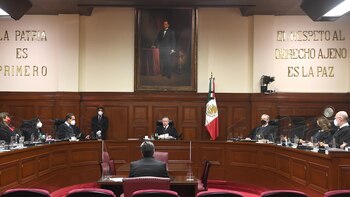
This Thursday, ministers of the Supreme Court of Justice of the Nation (SCJN) discuss in plenary session the constitutionality of the Electricity Industry Law, promoted last year by Mexican President Andrés Manuel López Ibrador (AMLO). The initiative seeks to give priority to the National Electricity Commission (CFE) over private companies in energy dispatch. Many voices, inside and outside Mexico, have spoken out against this project. The opposing arguments are also varied, ranging from the preservation of clean energy to equality in competition issues.
The center of thought and analysis México Evalua, is one of the organizations that has raised its voice about it. The most recent occasion was last April 4 through the following letter addressed to the ministers of the Supreme Court.
To the honorable ministers of the Supreme Court of the Nation:
From Mexico Evalua, we are deeply concerned about the discussion and voting on the three draft sentences that the rapporteur Minister, Loretta Ortiz Ahlf, has prepared in order to declare the validity of the reform to the Electricity Industry Law, which was amended in March 2021, and which was challenged. The bill seeks to discard the unconstitutionality action 64/2021 and constitutional disputes 44/2021 and 45/2021, promoted by 48 senators of the Republic, the Federal Commission for Economic Competition (Cofece) and the Government of the state of Colima. We can infer, in the light of the conclusions expressed in her draft judgments, that the minister considers that the reformed LIE does not violate economic competition or affect the environment.
However, we respectfully urge you not to give in to political pressure and to give priority at all times to the independence of the High Constitutional Court that you make up. We believe that the effects of the entry into force of the reformed LIE would be harmful to the environment, health and economy of Mexicans, by harming our ability to meet electricity generation targets with renewable sources. That is, the law would encourage increased greenhouse gas emissions and would privilege the generation of electricity at higher costs than today, causing severe distortions to the national economy and Mexican families. Let us remind you that Mexico is committed to meeting the mitigation goals set out in the General Law on Climate Change, which stipulates that by 2024 35% of electricity generation must come from clean energy.
Let us detail the main adverse effects that the entry into force of the reformed LIE, now contested, would pose:
* The violation of the regime of free competition and competition, provided for in articles 25, 27 and 28 of the Constitution, by effectively eliminating the autonomy of the Energy Regulatory Commission (CRE) and thereby weakening the regulatory body that strengthens the balance of balances and balances in the sector. Establishing criteria for subordination of CRE permits is another step in the weakening of the competition regime, and in the establishment of a centralized state planning regime that, as has already been well proven in the world, is inefficient, discretionary. Along the way, the possibility of further strengthening the right to compete and compete economically in a sector that is not enshrined as a strategic area in the Constitution would be eliminated. In practice, this would severely damage the conditions for attracting investment, due to the uncertainty created by the dissolution of the boundaries between the roles — on the part of the State — of planning and directing the electricity sector and the role of regulator, which is articulated through autonomous bodies that must act as arbitrators impartial and separate from political cycles.
* The discarding of market mechanisms would paralyze the technological change needed to encourage decarbonization of the electricity sector. The proposal to give Clean Energy Certificates (CEL) to all CFE generators, regardless of their date of entry into operation, detracts from their usefulness in promoting the technological transition to cleaner energy sources. We are concerned that this standard seeks to exempt the production subsidiary CFE Basic Supply from complying with its CEL requirements, as well as eliminating the need to acquire new CEL. With these measures, it would be very likely that the CEL market would gradually disappear.
* Electricity generation costs will be higher if the requirement for CFE Basic Supply to participate in auctions to purchase electricity is eliminated — as is pursued by the reform — which would entail higher tariffs and the need for greater electricity subsidies. In addition, if this happens, the risk of generation prices being abruptly affected by increases in input costs would increase (we must not forget that regulation currently favors generation at the lowest cost). In short, encouraging more expensive and more polluting energy generation would undermine opportunities for economic growth.
* Rights acquired by private investors in respect of legacy permits or contracts — corresponding to the figures of independent producers of energy and self-supply, which were created under the 1992 legislation, which has now been repealed, but which remain in force — would be violated. And this would be done on the basis of the criterion of “fraud of the law”, which does not exist in Mexican law.
It is also important for them to take into account that if the reformed LIE were to enter into force, it would breach international trade and environmental commitments. The most notorious case is that of the Free Trade Agreement with the United States and Canada (TMEC). Chapter 22, for example, sets out commitments to non-discriminatory treatment and principles of good governance that must be strictly followed by our productive State enterprises. In addition, Chapter 14 provides specific protection for investors who already have government contracts, covered against acts of indirect expropriation or breach of fair and equitable/minimum treatment standards.
Finally, it is imperative that the precedents created in the Supreme Court of Justice of the Nation be considered, since it was the Court that ruled in favor of the unconstitutionality of the Agreement issuing the Reliability, Security, Continuity and Quality Policy in the National Electricity System [Constitutional Controversy 89/2020] regarding the electrical dispatch mechanism proposed by the Agreement and which is the same mechanism that was embodied in the reformed LIE, which is now contested. If this reformed LIE were to enter into force, we would be faced with judicial irresponsibility.
Honourable Ministers, because of the public and social interest of the draft judgments that concern us, we ask you for the highest level of analysis and deliberation. This is a test for the division of powers for the Mexican State, and it is up to the Court to resolve it; to prove that there is a division of powers and to confirm its authority as the highest judicial instance and not as an annex to the legislative branch.
We are convinced that the electricity sector requires change: it must be strengthened in different areas to meet the challenges of climate change and the transition to clean energy, and to take advantage of the increased demand for electricity that will inevitably unfold through different technological transitions facing our world. We believe that the elements that constituted the reform of the LIE would not allow these objectives to be achieved. We are confident that their actions will be in keeping with the essential legal ethics. In short, it will rise to the challenges facing the country.
Attentively
Mexico Evaluates
KEEP READING:
Últimas Noticias
Debanhi Escobar: they secured the motel where she was found lifeless in a cistern

The oldest person in the world died at the age of 119

Macabre find in CDMX: they left a body bagged and tied in a taxi
The eagles of America will face Manchester City in a duel of legends. Here are the details

Why is it good to bring dogs out to know the world when they are puppies




